Blue steal: World Cup 1982 ~ Italy v Brazil
Assured azzurro?: Italy’s Paolo Rossi pursued by Brazil’s Sócrates in one of the all-time classic World Cup matches that would prove a critical turning point in 82’s terrific tournament
So, if you’re of an English persuasion like me, you’ll no doubt still be down in the mouth and in need of a tonic to get over the so-called Three Lions’ ignominious exit from South Africa at the weekend. And what better tonic could there be than to look back on this exceptional tournament and, in detail, its greatest match, in this, my fifth World Cup special? Well, short of throwing oneself into the smuggery of Wimbledon, I can’t think of a better one anyway.
Now, for some odd reason, the 1982 World Cup seems rather ignored or even forgotten when compared to its fellow illustrious football tournaments of times past. And that’s a shame, seems to me, because this one was an out-and-out crackerjack. Perhaps, over here in the UK at least, that has something to do with it taking place in the early ’80s. Before the rise of the yuppie, the invention of the brick-like mobile phone and Stock, Aitken and Waterman’s culpability for almost every song that found its way into the charts, the ’80s weren’t exactly a very colourful, optimistic or even an ‘us and them’ divisive time. Indeed, the early years of that decade were – perhaps predictably – far more like a continuation of the previous one and, thus, not too fondly recalled nowadays.
The fact was the policies – for better and worse – of new Prime Minister Margaret Thatcher hadn’t really bitten Britain yet and no single demographic of the population was clearly feeling the effect of 1979’s Tory election victory. In which case, money was tight for pretty much everyone as the economy was still far from bouyant, unemployment was high (although it would only rise in the next few years, of course), and civil unrest had reared its ugly head once more.
Famously, in April 1981, a day-and night-long violent riot had taken place in Brixton, a very multicultural borough of South London, thanks to the the area’s crime rate having grown rapidly owing to a recent rise in unemployment. The rioters, who were white as well as black, were initially angered by the sudden surge in police presence and its heavy-handed stop-and-search policy. Time Magazine referred to the event as ‘Bloody Saturday’, an allusion to the so-called ‘Bloody Sunday’ in Belfast at the height of ‘The Troubles’ in the early ’70s. Less well remembered is that in the same year similar riots had also broken out in Birmingham, Liverpool, Bristol, Leeds, Leicester, Coventry and Edinburgh, among other cities. Culturally, the feel of urban decay and despair seemed to be reflected through song with the ska-flavoured Ghost Town by The Specials and the driving punk-pop London Calling by The Clash, both of which were big chart hits of the era. The ’70s were over, but the country still seemed to lack direction then; it still felt like a sleeping giant that couldn’t quite pull itself up and forwards – and it desperately needed to.
Picasso and fiasco: World Cup ’82’s poster, inspired by the work of Spain’s greatest artist; tournament mascot Naranjito; and violence on the streets of London’s Brixton in 1981
In many ways, the same could be said for the England team that qualified for the World Cup of Summer ’82, held in Spain – although they were the first to do so in eight years. Indeed, the team even wore skin-tight shirts with bad patterns on them and very short shorts (or strangely iconic ’80s sportwear, if you prefer), just like every man on the street of Britain seemed to wear in early ’80s summers. And manager Ron Greenwood’s men hardly seemed like glamorous world-beaters either. Instead of 1966’s Charlton, Hurst, Moore and Banks, the class of ’82 boasted the likes of Francis, Wilkins, Brooking and an injury-carrying Kevin Keegan. Oh, and a promising young lad named Bryan Robson.
Ah, Bryan Robson. In actuality, it wasn’t the perma-permed Keegan, but this midfielder with energy and endeavour comparable to that of a Duracell bunny who turned out to be England’s talisman this tournament. And he hit the front as soon as 27 seconds into the side’s campaign, putting them 1-0 up against the much fancied France (packing the terrific Michel Platini and others) in their opening game. Impressively, this goal was to rank the fastest in World Cup history for the next 20 years. And come the 67th minute, Robson grabbed another – undeniably, a new star was born on the international stage – and thanks to a late strike from Paul Mariner, England won 3-1 and were off to a great start.
Indeed, with a further 2-0 win over Czechoslovakia and 1-0 win over Kuwait, in both of which striker Trevor Francis scored, England cruised through to the second group stage with a rare 100 percent record. Unlikely it may have seemed, but they were doing all right, better than all right, actually. Could they, as promised in their official tournament song, really ‘get it right this time’? Of seemingly less interest at this stage, France also made it through the group in second place.
Actually, as if to kick some juice into the ’80s, right from the off and all over the shop this was an exciting World Cup. The tournament had, in fact, opened with an Argentina-Belgium fixture – surely a bog-standard victory for the former, the reigning champions? Erm, well, no as it turned out. Having underestimated their rivals, the Argentines fell to an embarassing 1-0 defeat. Still, along with the Belgians they did manage to progress to the next round. Almost as impressively, the other highlight of this group was the match between its two minnows, Hungary and El Salvador, which was won to the tune of 10-1 by the former, surely reminding their nation of the fine side it possessed back in the ’50s. This crazy scoreline is still the joint second highest ever achieved in the competition’s history.
Burly start, curly non-stalwart: Bryan Robson scores his first goal against France; Kevin Keegan struggles and, inset, the fashion statement that was the World Cup ’82 England shirt
Elsewhere, the mighty West Germany’s opener produced another unexpected result, beaten, as they were, 2-1 by Algeria – the first ever African victory in a World Cup. Erstwhile and efficient as ever, mind, the Germans did make it through to the next stage, but not without controversy. In their final game of the round, they faced Austria (with whom they’d shared an infamous match in the ’74 contest) and the two teams, knowing they’d both go through if West Germany won 1-0, completely shut up shop and kicked the ball around in a strange unspoken agreement as soon as the former scored a goal early in the first half. The Spanish-majority crowd, TV audiences around the world and even the fans of the two countries were appalled by this behaviour – disgusted, a German fan in the stadium even burned his nation’s flag. How could this have happened?
Well, just as in the immediately previous World Cup when Argentina had managed to get through to the final with a dubious defeat of Peru, this match had taken place after all the others in the group had been played so both teams knew exactly what they needed to do in the game. This sort of thing needed stamping out once and for all, and finally in the next tournament FIFA ensured such an unfair advantage wouldn’t take place again, but clearly the desire to act had come not one, but two, World Cups too late.
There were three more groups in the first round this year (yes, that’s six in all) and, in spite of the three mentioned so far, none of them generated more surprise than the one in which Italy found itself. At the beginning of this tournament, it wasn’t so much Forza Italia as For goodness sake, Italia. In an occurence that, incredibly, would be repeated 24 years later in 2006, going into the contest the Italian domestic game had been rocked to its very roots by a huge match-fixing scandal across its top league Serie A. So bad had the debacle been that the clubs AC Milan and Lazio had been relegated to Serie B in punishment, while major players had served suspensions, including star striker Paolo Rossi who had been dished out with a two-season ban (even though evidence that’s since come to light suggests he may have been innocent).
All the same, to all intents and purposes the 1980 Totonero had surely provided the Azzurri with the worst possible preparation for this World Cup, and that appeared to be proved so in their opening group when, shamefully as far as their compatriots were concerned, they scraped through to the second round by the skin of their teeth, drawing 0-0 with Poland, 1-1 with Peru and 1-1 with Cameroon. In fact, the Africans were only denied the place that went to the Italians because they had scored one goal less, tied on points as they were. This was despite the fact the former had had a perfectly good goal from striker Roger Milla disallowed against Peru. In great contrast to Italy, Poland put five past Peru and qualified for the next round by topping the table. Indeed, the Poles were bolstered by the now legendary striker-from-midfield Grzegorz Lato appearing in his third consecutive World Cup – unsurprisingly, he was one of those who’d got on the scoresheet against the Peruvians. Rossi, meanwhile, hadn’t come close to a sniff in his three matches and, famously, the Italian media is supposed to have referred to him as a ghost wandering aimlessly over the field.
The pluck of the Irish: Northern Ireland defeat Spain (left) thanks to a strike from hero Gerry Armstrong (right)
Wandering aimlessly through the first group stage had been the preserve of the home nations in recent World Cups, but, like England, another UK representative had a cracking time of it – frankly, to the utter shock of the footballing world and, in particular, the hosts. Northern Ireland had qualified for the ’82 tournament – their first in 32 years – and following plucky draws against Yugoslavia (0-0) and Honduras (1-1), they did the unthinkable, yes, thanks to a single goal they beat Spain… in Spain… in Spain’s World Cup. An amazing feat that saw them through to the next round by incredibly topping the group. The Spanish, a disappointing team in their home World Cup, joined them there with a record of one win, one draw and that one loss against the Northern Irish.
If luck was going the home nations’ way elsewhere, then, perhaps predictably, it didn’t rub off on the Scots. Through to their third Cup in a row, they – like everybody else in their group – demolished New Zealand and claimed a fighting draw against the Soviet Union, but that result wasn’t good enough and saw them cruelly go out – yet again – on goal difference. However, in truth, this group was only really about one team. Indeed, the entire early stages of the tournament were only really about one team… Brazil. Yes, that’s right, Esquadrão de Ouro were back, and, indeed, they did appear to be a golden squad once more.
For they had captain, midfield maestro and eventual cult figure Sócrates, who was as much loved for his terrific beard as for his silky skills (and for sharing his name with Ancient Greece’s pre-eminent philosopher, of course); they had the goalscoring machine that was Zico (also, in fact, a midfielder rather than a striker – well, he was Brazilian, after all); they had another outstanding midfielder in the shape of the marvellous Falcão; they had the left-winger with a beautiful touch Éder; and, finally, they had the very useful striker Serginho. Just like back in 1970 when they’d last won the thing, the Brazilians looked the real deal, displaying footballing ability and clinical finishing unlike any other side thus far. They defeated the decent Soviets 2-1, beat up Scotland 4-1 and put another four past New Zealand without reply; Zico scoring three, Serginho two, Éder another two and Falcão yet another two in the process. To say by the end of the opening group stage they were favourites for the tournament would be like saying cameramen traditionally like lingering on on bikini-clad Brazilian female fans dancing in the stands. World Cup ’82 was well and truly rocking already, and to an undeniable samba beat.
Puzzlingly, unlike in the last two World Cups where the second group stage had comprised two groups of four teams, this one’s second round of groups comprised four of three teams. Three may be a magic number, but it’s an odd number for a group in a football contest, surely. However, this change did ensure that the winners of each of the new groups – four of them, of course – would go through to a pair of semi-finals, which had been blessedly reinstated after going AWOL in the ’74 and ’78 tournaments, so perhaps there was some actual method to the madness. Talking of methods, having applied a successful one to their first group, the Poles did exactly the same to their new one (the first of the second round), beating Belgium 3-0 as they did, thanks to a hat-trick from hot-to-trot striker Zbigniew Boniek, and drawing against the Soviet Union. After their previous heroics, Belgium, a little sadly, weren’t to go any further; conversely, Poland were the first side through to the semis.
And joining them there – you guessed it – were West Germany. The nation who, by now, was really making a habit of being there or thereabouts in every football contest in which it participated, got the better of both the pretty woeful Spain and, yes, England. The Germans beat Spain 2-1 and drew 0-0 with England (hardly a match that latter one, then, to rival the clashes of ’66 and ’70). For their part, England also picked up another 0-0 draw with the hosts. In the end, injuries – in particular to the man who perhaps could have delivered the goods for them, the Superstars superstar himself Kevin Keegan – had caught up with the English this campaign, but they did have the (in)glorious honour of returning home having not lost a game.
In contrast, the side who England had so impressively beaten in their first match, France, cruised through their second group, beating Austria 1-0 and Northern Ireland 4-1. This second stage was clearly a step too far for the otherwise terrific Northern Irish, but they’d had a legendary tournament and could boast one of its top scorers in three-goal hero Gerry Armstrong, who – given his team had defeated the hosts – would somewhat ironically switch Watford for Real Mallorca the following year. As Jimmy Greaves had a wont to say once upon a time, football really is a funny old game.
The final group of this World Cup was unquestionably what the media would nowadays dub ‘the group of death’, containing, as it did, Brazil, Italy and Argentina. The latter of those three were, of course, the World Cup holders, but losing as they already had to Belgium, they weren’t the team of four years before (not least because they didn’t possess the huge home support they had enjoyed in their home country then). They fell first to a 2-1 defeat to Italy – the latter’s goals coming from decent-looking midfielder Marco Tardelli and left-back Antonio Cabrini – and then to a 3-1 defeat to Brazil – for whom Zico and Serginho again scored. Those results ensured that the Argentines were out of it and it now all came down to the Brazil-Italy clash to decide the final semi-finalist. And what a clash it turned out to be. In a word, it was incredible.
Dream team: Brazil’s Falcão, Zico and Serginho in action – but could they win the World Cup?
Not that, before kick-off, it looked like it was going to be that much of a contest, of course – Brazil were the undoubted pre-match favourites. Yet, lest we forget, in addition to its importance as a decider of a semi-final place, this match also saw these two great footballing nations clash for the first time in a meaningful World Cup tie since the classic 1970 final. And, just as then, it was those in green and gold who held all the artistic aces, beginning the game, as they did, with the sort of skill, style and flambouyance they’d shown throughout this tournament. In answer to this, the Italians looked set to rely on an old favourite of theirs, catenaccio – the smart, if not arty, tactic of playing defensively (indeed, catenaccio translates from the Italian as ‘door-bolt’) – a method of play dreamt up and used very effectively by Inter Milan in the ’60s to scoop up Scudetto after Scudetto. In actual fact though, the system Italy used in this World Cup was a slightly modernised, more flexible version that has become known as zona mista (‘mixed zone’) – and, make no mistake, the boys in blue used it in this match with bells on.
The first indication that the game wasn’t going to go to the script – or even go to the form of either side so far – was unmistakeable: Paolo Rossi scored a goal. The event took place just five minutes into play too, when the much-maligned marksman nodded in a cross from Cabrini, showing the true poaching instincts that had made him such a star in his homeland years before and which had so far eluded him so clearly this competition. True to their instincts as a good Brazilian side though, the samba boys didn’t panic and played their natural easy-on-the-eye and, when necessary, powerful and decisive football – and got what they deserved in the 17th minute when a marvellous move culminated in Sócrates brilliantly striking home at the Italian keeper’s near post. 1-1. This was shaping up to be a good contest. And it got better.
Just three minutes later, stepping past a defender and intercepting a loose pass across the other penalty area, an utterly reinvigorated Rossi lashed home a shot into the Brazilian net, putting his side back into the lead. 2-1. If the Brazilians were stunned by going behind again – and to Rossi again – they didn’t show it. Instead, they bombarded their opponents’ half of the pitch and bore down on the opposing penalty area for much of the remainder of the match. However, owing to the Italians’ drilled organisation and, in particular, the exceptional work of central defenders Claudio Gentile and Gaetino Scirea, the South Americans just couldn’t get through. The passes, interplay, shots, strikes, volleys and venom from the Brazilians were no good, the Azzurri were standing firm – and conducting an admirable masterclass in how perfectly to counteract such great forward play. Indeed, Gentile had been charged the unenviable task of man-marking Zico and so good did he do it he picked up a yellow card for his efforts, but Brazil’s irresistible Number 10 neither scored a goal nor set up another the entire match.
Finally, however, the fabulous Falcão did find a way through the Italian resistance when he scored from a full 20 yards out in the 68th minute, the delight and relief etched on his face as he celebrated with his teammates – at 2-2, Brazil would now be through to the last four on goal difference; the Italians out. But someone had other ideas. And who was it? That’s right, you guessed it. Popping up in the Brazilian box just six minutes later and connecting as quick as lightning to a poor clearance from his side’s corner, that man Rossi sealed an amazing hat-trick, sending his team 3-2 in front and, yes, into the semi-finals.
Keeper’s KO: Harald Schumacher crashes into Patrick Battiston in the second semi-final
Over the years, many have decried this match owing to it sending such a brilliant Brazilian side out of the World Cup. Indeed, the BBC’s John Motson has claimed his co-commentator for the game Bobby Charlton cried at the end of it for that very reason. Yet, there’s always two sides in a football match, and there’s often two ways of playing one – and this match showed up both in their equally fascinating extremes. While Brazil played near-fantasy football in this World Cup, the style the Italians played was (arguably) just as impressive, more effective and ultimately smarter. Their defensive counter-moves to Brazil’s forward-efforts were brilliant in their own way and their break-away counter-attacking (now such a recognisable and welcome part of modern football the world over) was thrilling, decisive and winning. There’s a reason why it took Brazil 24 years to win their next World Cup after the beautiful triumph of 1970; until 1994 they didn’t play defensively – or, if you like, smartly – enough to do so. It was perhaps this very match that taught them the lesson that free-flowing, fluid, forward-dominated football wasn’t enough to conquer the world anymore; you needed to be smart like the Italians too.
And lucky as well, it should be said. For in their semi-final the latter met the Poles, who, having had a great tournament thus far, really didn’t perform and against an Italy that had just found its form – fortuitously? – at the right time went down 2-0. Both goals came from Rossi. Italy too were perhaps lucky they didn’t face either side that contested the other semi-final, two true European powerhouses in the sport at this time, France and West Germany. And, make no mistake, this particular meeting made for another stonker of a match.
The drama began as early as the 17th minute when German midfielder Pierre Littbarski opened the scoring, only for his goal to be negated by a Michel Platini penalty in the 26th. Platini was involved again in the second half’s – and probably the entire match’s – most memorable moment when his fine pass put defender Patrick Battiston through on goal, only for German keeper Harald Schumacher to come racing out and… not clear the ball, but miss it completely as he delibarately floored the unrushing Frenchman. Play was halted for several minutes while the unconscious Battiston was stretchered off the pitch, the result of which being that neither a penalty was awarded nor was Schumacher sent off, the referee deeming the assault not even to have been a foul. For his sins, the coolly gum-chewing, shockingly permed German keeper took the goal-kick and the game resumed. At least after the match he offered to pay Battiston’s dental bill when it was revealed he’d knocked two of the poor feller’s teeth out, although one may say that was adding insult to literal injury.
Into extra-time the match went then and on 92 minutes, French sweeper Marius Trésor volleyed home to make it 2-1 and six minutes later his teammate Alain Giresse finished a swift counter-attack to put their side two goals clear. But you can never count out the Germans, oh but you can’t. On 102 minutes they themselves scored following a counter-attack through Bayern Munich’s European Footballer of the Year, German squad captain and very recent substitute Karl-Heinz Rumenigge, while in the 108th a terrific move was topped off by a volley into the net in the form of a bicycle kick from Klaus Fischer (since voted German football’s greatest ever goal). The scores were level once more then at 3-3, and that meant… penalties. Of course, penalty shoot-outs to decide knock-out matches in international football are ten-a-penny nowadays, but back in 1982 they were a great rarity. Thus, this fatalistic, sado-masochistic manner to decide a winner merely seemed to lend this epic match a fittingly über-dramatic climax. And, predictably, it was the Germans who proved the über penalty-takers, winning the shootout as they did – as they always seem to.
Abiding memories: Paolo Rossi scores – again – in the final (left); Marco Tardelli’s explosive and utterly unforgettable goal celebration (right)
So, Italy versus West Germany in the final. It had a nice ring to it and, as if this World Cup hadn’t had enough already, it proved to be yet another memorable, quality match. Save a missed penalty from Italian Cabrini, the game was goalless and honours even going into the second half – and that’s when it really sparked into life. And who was it who provided the spark? Who else could it be now but Paolo Rossi, as in the 57th minute he headed in a low cross at very close range. Having mastered their zona mistra system against the Brazilians, the Azzurri now struck gold with it against the Germans. The latter were clearly knackered from their huge semi-final exploits against the French, while their far sprightlier opponents wre defending superbly (especially Gentile and Scirea again), which ensured they could counter-attack and apply the sucker-punch – not once, but twice. First, on 69 minutes Tardelli scored from range to put Italy two clear, then substitute striker Alessandro Altobelli sealed the win twelve minutes later following a great solo run from Conti down the wing. Paul Breitner managed to pull one back in the 83rd minute for the Germans (impressively, his second goal in two World Cup finals, as he’d already scored a penalty in the ’74 final), but it was scant consolation. The boys in blue had done it – they’d won the World Cup for the third time in their history.
And, following the terrible match-fixing scandal that had preceded their tournament and the frankly terrible start they’d made to it, it was rather a remarkable win for them too (indeed, as hinted at earlier, the whole thing seemed to repeat itself for Italy as they went into, competed in and eventually won the 2006 World Cup – bizarre really). Not just that, though. Having been a laughing stock right up until his side’s third match from the end, Rossi finished the contest as top scorer with six goals, ensuring he picked up not just the Golden Boot, but also the newly introduced Golden Ball award for the tournament’s best overall player. Not bad going for an aimless ghost.
Perhaps this terrific tournament’s most enduring memory, though, is the celebration of Marco Tardelli as he scored Italy’s second – and decisive – goal in the final. Raising his hands in clenched fists, his mouth opening into a square and his eyes widening, he sprinted away along the pitch and towards his team’s bench, completely lost in the ectasy and majesty of the moment. And, you’ve got to say, it’s an image that fits this tournament like a glove, one of the most entertaining, exciting, colourful, controversial, crazy and unpredictable sporting contests there’s ever been. Yes, it was 1982 and it may have been drab in Britain, but this World Cup and all its components had surely afforded the country – and the world – something of a taster of the extraodinary decade that was to come… 


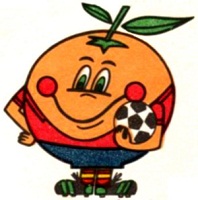



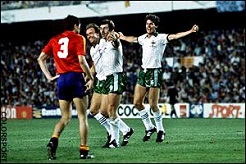



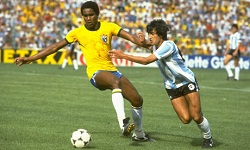

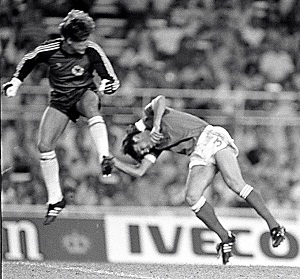

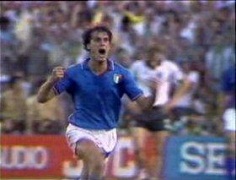






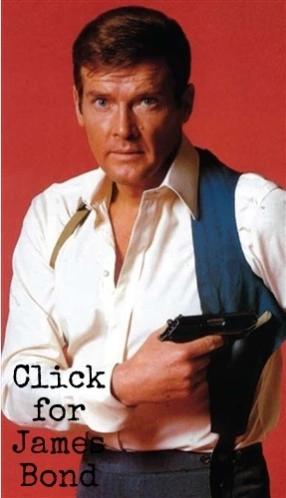













Trackbacks